高中英语人教版必修3 Healthy eating Using Language(共99张PPT)
文档属性
| 名称 | 高中英语人教版必修3 Healthy eating Using Language(共99张PPT) |
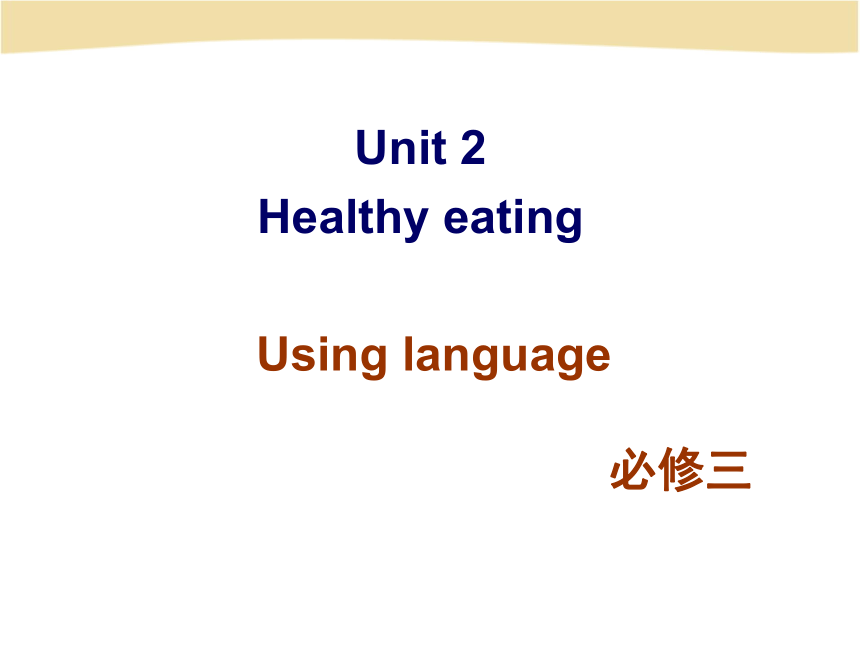
|
|
| 格式 | zip | ||
| 文件大小 | 2.3MB | ||
| 资源类型 | 教案 | ||
| 版本资源 | 人教版(新课程标准) | ||
| 科目 | 英语 | ||
| 更新时间 | 2018-05-22 00:00:00 | ||
图片预览

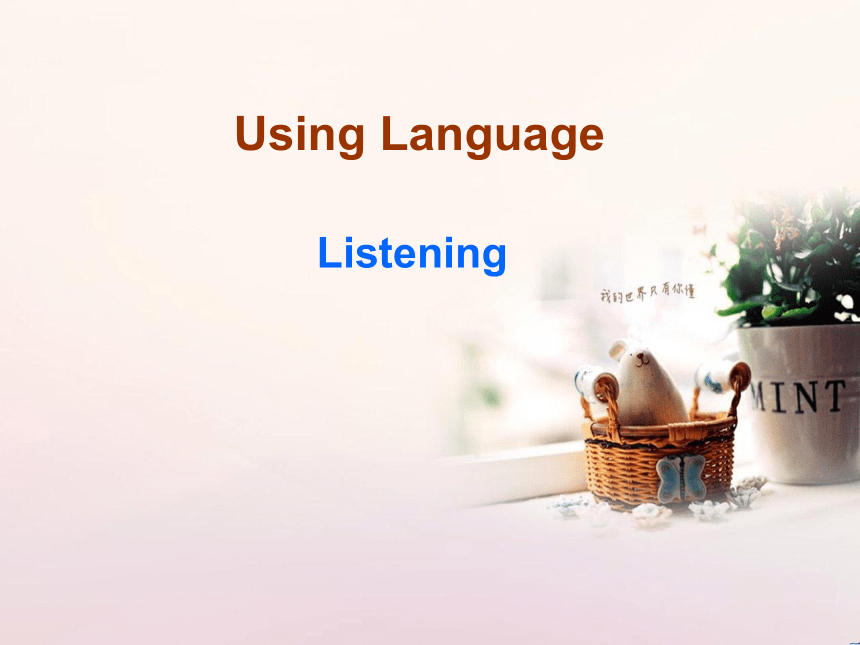
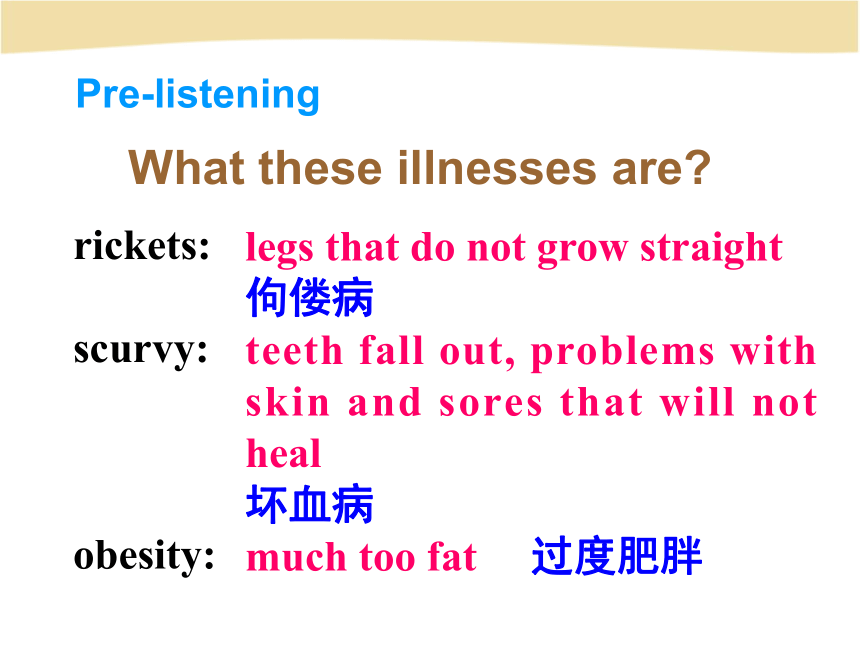
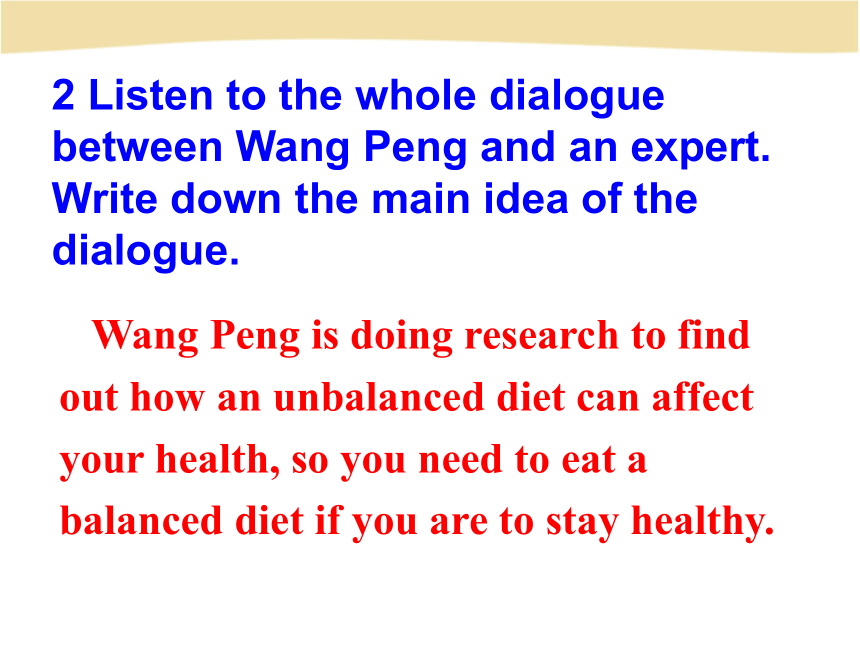
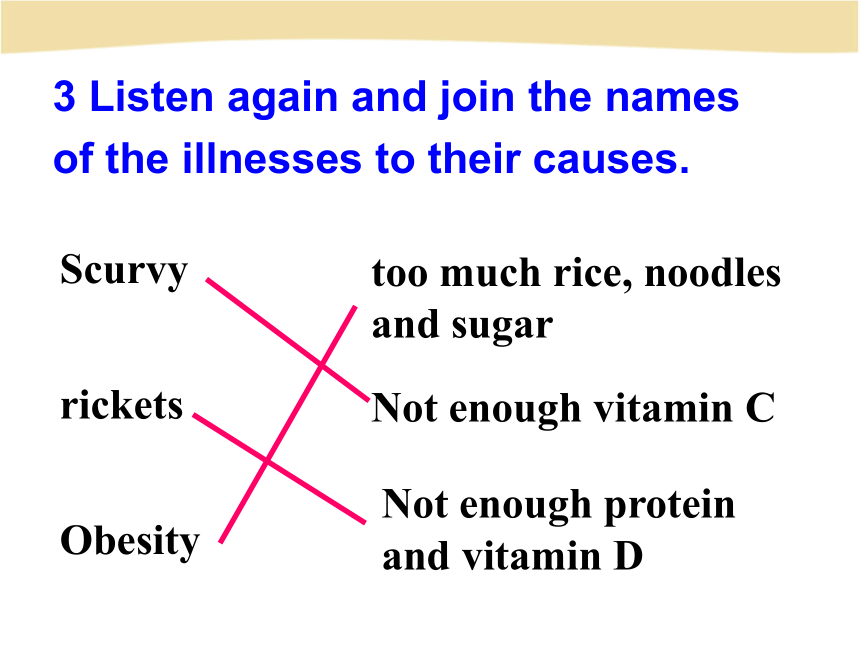
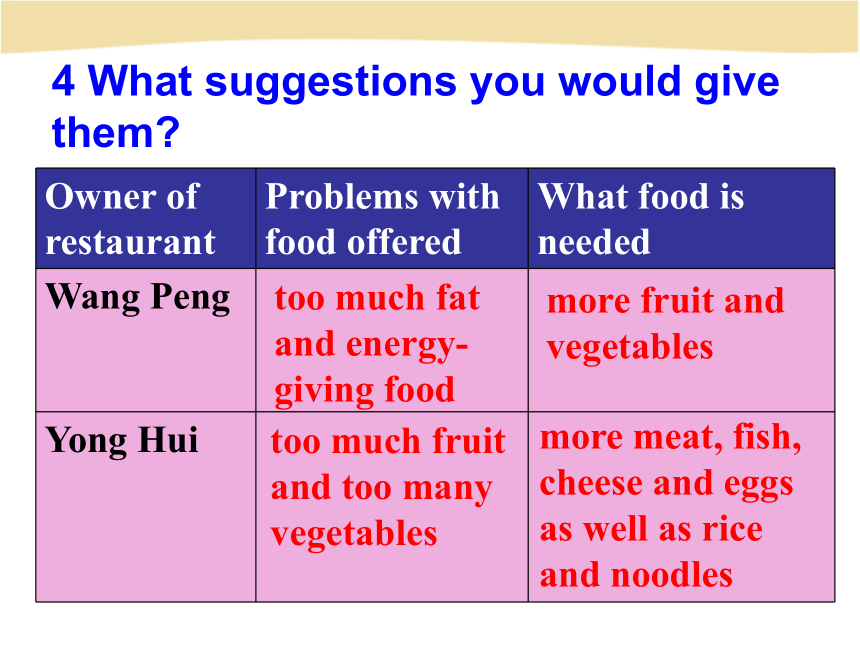
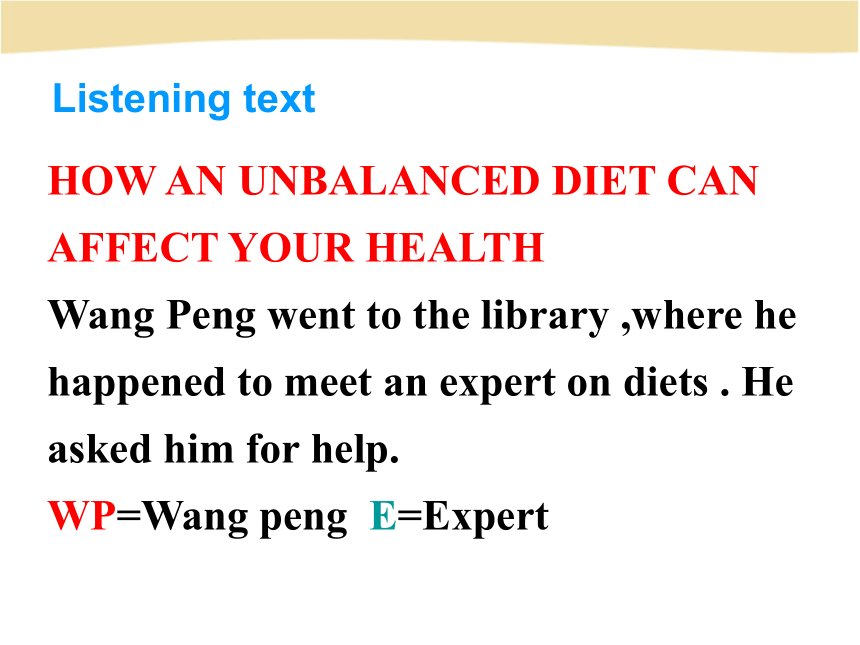
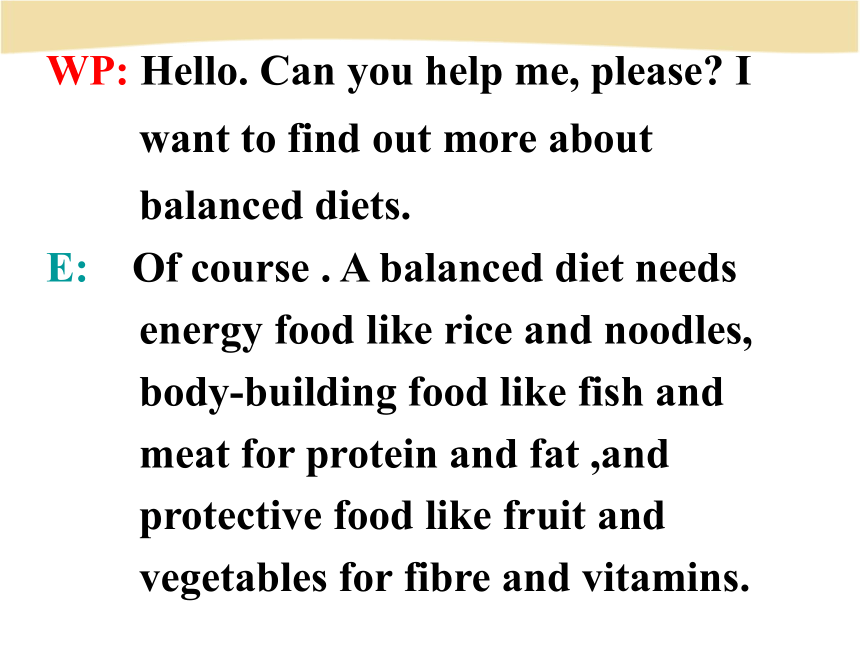
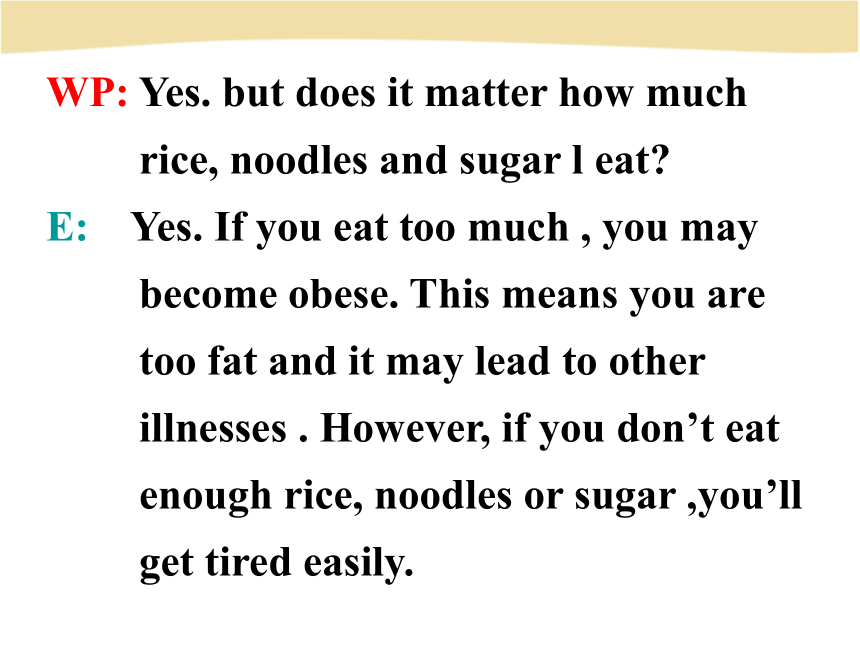
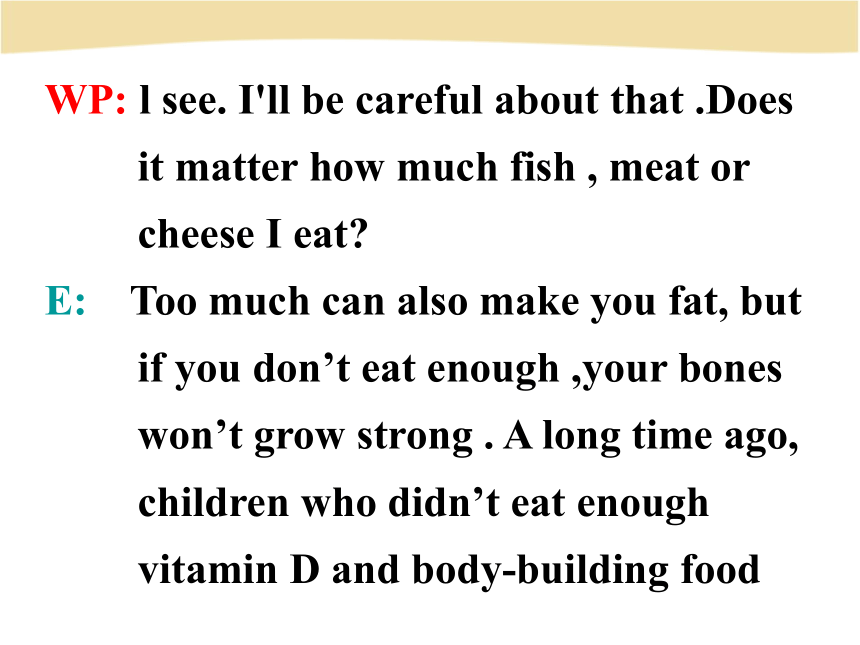
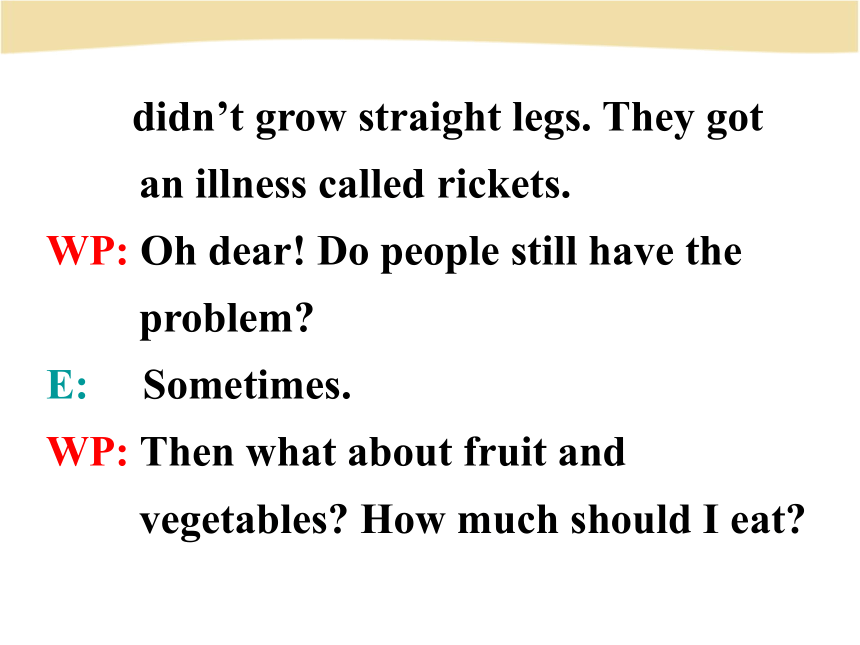
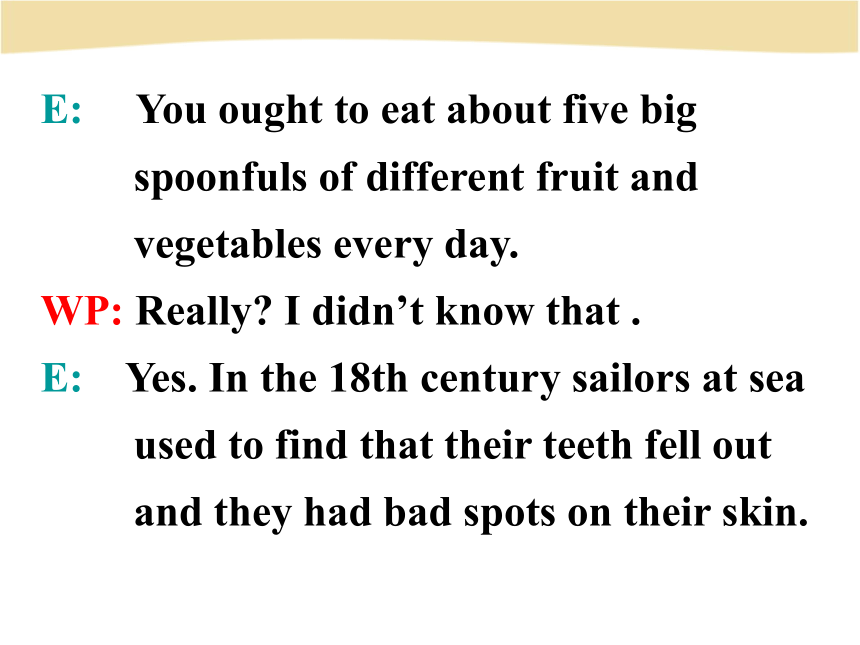
文档简介
课件99张PPT。Unit 2
Healthy eating
Using language必修三Using LanguageListeningrickets:
?
scurvy:
?
obesity:
legs that do not grow straight
佝偻病
teeth fall out, problems with skin and sores that will not heal
坏血病
much too fat 过度肥胖 What these illnesses are?Pre-listening Wang Peng is doing research to find out how an unbalanced diet can affect your health, so you need to eat a balanced diet if you are to stay healthy.2 Listen to the whole dialogue between Wang Peng and an expert. Write down the main idea of the dialogue.Scurvy ricketsObesity too much rice, noodles and sugarNot enough vitamin C Not enough protein and vitamin D 3 Listen again and join the names of the illnesses to their causes.4 What suggestions you would give them?too much fat and energy-giving foodmore fruit and vegetablestoo much fruit and too many vegetablesmore meat, fish, cheese and eggs as well as rice and noodlesHOW AN UNBALANCED DIET CAN AFFECT YOUR HEALTH
Wang Peng went to the library ,where he happened to meet an expert on diets . He asked him for help.
WP=Wang peng E=Expert Listening textWP: Hello. Can you help me, please? I want to find out more about balanced diets.
E: Of course . A balanced diet needs energy food like rice and noodles, body-building food like fish and meat for protein and fat ,and protective food like fruit and vegetables for fibre and vitamins.WP: Yes. but does it matter how much rice, noodles and sugar l eat?
E: Yes. If you eat too much , you may become obese. This means you are too fat and it may lead to other illnesses . However, if you don’t eat enough rice, noodles or sugar ,you’ll get tired easily.WP: l see. I'll be careful about that .Does it matter how much fish , meat or cheese I eat?
E: Too much can also make you fat, but if you don’t eat enough ,your bones won’t grow strong . A long time ago, children who didn’t eat enough vitamin D and body-building food didn’t grow straight legs. They got an illness called rickets.
WP: Oh dear! Do people still have the problem?
E: Sometimes.
WP: Then what about fruit and vegetables? How much should I eat?E: You ought to eat about five big spoonfuls of different fruit and vegetables every day.
WP: Really? I didn’t know that .
E: Yes. In the 18th century sailors at sea used to find that their teeth fell out and they had bad spots on their skin. They got it because they didn’t eat enough fruit and vegetables. The illness is called scurvy.
WP: Goodness! What about now ?
E: It’s very rare now. People eat more fruit and vegetables. You need protective food like that for clear skin and bright eyes.WP: Thank you very much. You have given me a lot to think about. Which illness do we still have today?
Why is it we don’t get scurvy or rickets today?
Who got these illnesses and why?DiscussionObesityMore varied diet: vitamin C
for scurvy; vitamin D for rickets2. More understanding of what we need to stay healthyScurvy: sailors who did not eat fresh fruit and vegetablesRickets: children who did not get enough sunshine or oily fish to eatReading and discussingCOME AND EAT HERE (2)What do you think Wang Peng will do to win his customers back?How do you think the story will end?Review Wang Peng may offer more protective foods with his meals such as salad.
He may cook his food in less oil.
He may stop serving ice cream and cola because both of those have too much fat or sugar. Wang Peng may lose his restaurant.
Yong Hui may come to his restaurant and become very angry with him.
Yong Hui’s customers will become so tired that they will return to Wang Peng’s restaurant.3. Can you guess what
he will do after he
comes into the
restaurant?1. Who is the man in the picture?
2. What is he doing?Look at the picture and answer the
following questions:PredictionCan you guess what will happen to
Wang Peng and Yong Hui?+=Combine their menu and
provide a balanced one
1. raw vegetables with
hamburgers
2. the boiled potatoes,
not fried
3. fresh fruit with ice
cream1. cut down the fat
2. increase the fibre
3. a big successcompetitorscoupleHow has their relationship changed?Fast-reading1. Wang Peng was worried when he thought his restaurant would no longer be popular because ______.
A. he would be in debt
B. he could no longer earn his living
C. he would lose his job
D. his friend would not visit him2. Yong Hui was very angry when she came to Wang Peng’s restaurant because ________.
A. she thought he was a new customer
B. she thought he had spied on her restaurant
C. she was told he was a spy
D. he was too fat3. Wang Peng’s research showed __________.
A. his menu was balanced
B. both menus were balanced
C. Yong Hui’s menu was balanced
D. neither menu was balanced4. He suggested they provide a combined menu because ______.
A. he liked Yong Hui
B. he didn’t want to lose his customers
C. he thought his menu was better
D. this would provide a balanced dietWang Peng can earn his living now,
but he will be in debt.
2. Yonghui thought Wang Peng spied
on her menu.FTStep 1: True or false3. Yonghui didn’t like the food in Wang
Peng’s restaurant.
4. Wang Peng would miss his dumplings
and fatty pork even if in his own
restaurant.FT1. How did Yong Hui feel when she
came to Wang’s restaurant? Why?She felt angry because she thought Wang Peng had come into her restaurant to spy on her. Step 2: Answer these questions.2. What did they find after their chat?They found they didn’t offer balanced diets. Because Wang didn’t offer enough fibre and Yong Hui didn’t offer enough body-building or energy-giving foods.3. How did they solve their problems
and become good friends?a. Wang Peng showed that he wanted
to cooperate and not compete with
Yong Hui.
b. They succeeded in finding a menu
that provided a balanced menu.4. How did they combine their menus
and provide a balanced menu?They served raw vegetables with the hamburgers and boiled the potatoes rather than fried them, and served fresh fruit with ice cream.5. Why was their cooperation a success?a. They cooperated successfully in
business.
b. They liked each other.The next day, his restaurant was full of people again. He did not look forward to being __ ____. Suddenly Yong Hui walked in. She ______ ___ him. She thought he came to her restaurant only to ____ ___ her and her menu. Wang Peng invited her to try a meal in hisin debtglared atspy onSummary restaurant. They ___________ the ice cream. And they had a good time. After that, they ________ their menus and _________ a balanced menu _____ food full of energy and fiber. At last, they
___ ________ and lived happily. were servedcombinedprovidedwithgot marriedDiscussion
What can we learn from the passage?We can learn that it is never too late to change bad eating habits and begin afresh.
Or students own answer.Read the text Come and eat here (1-2) (P10 & P14-P15) and fill in the blanks with proper words.Conclusionvegetablesice creamfatfibre fitbalancedthin / slimwaterbody-buildingtiredII. Read Come and eat here (1-2) and choose the best answer.
1. Why did Wang Peng feel frustrated that day?
A. Because he did not cook foods as good as before.
B. Because no one came to his restaurant.
C. Because Li Chang didn’t like his food any more.
D. Because people didn’t like his food.B2. From the menu of Yong Hui’s restaurant, we can see ______.
A. people are fond of the food
B. her food is good for health
C. it doesn’t offer enough energy to people
D. it offers people a variety of foodC3. After leaving Yong Hui’s restaurant, Wang Peng thought the following EXCEPT ______.
A. he wanted to know the secrets of Yong Hui
B. he should go to a library
C. his food has many advantages
D. his restaurant should be improvedA1. Perhaps he would be able to earn his living
after all and not have to close his restaurant.
也许他仍然能够谋生, 而不至于关张了。
earn one’ living by...=live by...=
make a living by...
He earned his living by begging from door
to door.
表示“谋生”的短语:
earn a living earn one’s living
make a living make one’s livingLanguage points earn vt. 挣得; 赢得
His success earned him a prize.
He earned fame by helping the students.
He and his wife each ____ 10 yuan an hour.
earns B. earn C. spends D. takes
2) after all 意为“终究; 结果” , 表示结果与
预想不同, 通常置于句尾, 也可以表示“毕竟”,
引出原因, 通常置于句首。
It has turned out to be a nice day after all.
天气终于转晴了。B【拓展】after all 作介词, 表示“虽然”。
After all his efforts, he also failed this time.
虽然他很努力, 但他这次还是失败了。
There are 50 books _______.
Don’t be angry with her, she is a child
__________.
I don’t like this new job ________.
The house is modern and comfortable, and
____ in a quiet neighborhood.
A. at all B. after all C. in all D. above allin allafter allat allDacquire, obtain, gain, get, win, earn这些动词均含“获得、取得、得到”之意。
acquire: 强调通过不断的、持续的努力而获得某物,也指日积月累地渐渐地获得。书面语用词。
obtain: 较正式用词,着重通过巨大努力、要求而得到所需或盼望已久的东西。gain: 侧重指经过努力或有意识行动而取得某种成就或获得某种利益或好处。
get: 普通用词,使用广泛,可指以任何方式得到某物,也不一定要经过努力。
win: 主要指通过努力、斗争、比赛等而获得胜利。
earn: 侧重指依靠自己的劳动或因付出代价与有功而获得。2. He did not look forward to being in debt
because his restaurant was no longer popular.
他可不希望由于餐馆不受欢迎而负债。
1) debt: [C] 债务; 欠款
be in debt: 欠债
be out of debt: 还清债务
be in sb’s debt: 欠某人之情
You saved my life, I am forever in your debt.
他救了我的命, 我永远感恩不尽。debt也可以是可数名词,如owe a debt
(欠债);pay one’s debts(偿还债务)等。和debt搭配的常用短语有get into debt, run
into debt, fall into debt, be in one’s debt等。2) no longer=not ...any longer 不再
He no longer loves here.
I can’t wait any longer.
no more表示数量上或程度上“不再”
no longer 表示时间上“不再”延续
He is no more a student.
He is no longer young.no more...than/not more...than
no more...than ......和......一样不(两者都否定)
not more...than 不如...(前者不如后者)
Xiao Li is no more diligent than John.
小李不勤奋,约翰也不勤奋。
Xiao Li is not more diligent than John.
小李不如约翰勤奋。3. He smiled as he welcomed some customers warmly at the door but the smile left his face when he saw Yong Hui walking in. [点拔]这是由but连接的两个并列句, 两个分句又都是主从复合句。主句分别为He smiled和the smile left his face;从句分别为as和when引导的时间状语从句, 即as he welcomed some customers warmly at the door和when he saw Yong Hui walking in.as引导的时间状语从句强调主句和从句中的动作同时发生, 即一边微笑, 一边迎接客人。when引导的时间状语从句表示主句中的动作和从句中的动作时间上的差异, 即表示见到咏慧进来时笑容消失了。4. She didn’t look happy but glared at
him. 她双眼直瞪着他, 看上去很不高兴。 glare vi. 怒目而视
glare at sb. 怒目注视某人1) glance:
glance (at, over) 看一眼
2) glimpse:
catch/get a glimpse of 瞥见to look at something quickly and briefly. to see by chance, just for a moment.
瞥见, 一瞥 3) glare:
glare at sb. 怒视某人
4) stare:
stare at/into 盯着to stare angrily, freely. It emphasizes hostility.
怒视, 瞪眼 to gaze intently esp, with wide-open eyes.
盯, 凝视5. I thought you were a new customer and
now I know you only came to spy on me
and my menu.
我本来以为你是一位新顾客, 现在我才发现你
只是过来打探我和我的菜谱的。 only to spy... 在句中做目的状语 only to do sth. 表示一个与主语愿望相反的
或出乎主语预料的结果, 或用来暗示最初的
未能实现的动作。
only doing sth. 表示谓语动词本身的动作
造成的结果。 @ spy v.侦察, 窥探:观察到, 注意到
n. 间谍
spy on 暗中监视,侦查e.g. They tried to spy on the enemy’s movements.
I’m sure my neighbors spy on me.I spied three persons in the distance.
You are quick at spying her mistakes.6. I don’t want to upset you, but I found your menu so limited that I stopped worrying and started advertising the benefits of my food.
[点拨] 此句是由but连接的并列句,在第二个并列分句中含有so ... that ... 结构。that从句中又含有由and连接的并列谓语stopped worrying 和 started advertising。在so / such ... that结构中, so多用来修饰形容词或副词原级, such多用来修饰名词。当被修饰的中心词为可数名词单数时, 其结构分别为:so + adj. + a / an + n.和such + a / an + adj. + n.。如:
It was such good news that he felt very excited at it.
It was such a wonderful film that I saw it many times. = It was so wonderful a film that I saw it many times.@ limited adj. 有限的e.g.
The number of competitors is limited.
He is a man of limited ability.
As they had limited experience,they often had
limited ideas.
I’m willing to hep you within limits.相关结构:
limit…to…/set a limit to…/
there is a limit to…
2. within limits 在有限在范围内 @ benefit n. 利益;好处
vi. &vt.有益于;有助于;受益
beneficial adj. 有益的,受益的
e.g. The rain is of great benefit to the plants. 雨水对植物大有好处。? 1) benefit(from/by) vi. 受益于 vt. 有益于, 有助
2) be of benefit to=be beneficial to 对…有益
3) 短语:for sb’s benefit=for the benefit of “为了……的好处/考虑” 7. Why don’t you sit down and try a meal ?
你为什么不坐下来吃顿饭呢?
“Why don’t you + 动词原形?”
相当于“why not+动词原形?”
表示建议, 意为“为什么不…… ?” Why not come and join us ?
为什么不加入我们呢?
【注意】 “why not + 动词原形?”和“why +
动词原形?”两个句型中, 前者表示建议,
后者表示责备、不赞成。
Why argue with her ?
为什么要与她争吵呢?(不赞成你与她争吵)8. Yong Hui agreed to stay and soon they
were both enjoy the dumplings and breast
of chicken cooked with garlic.1) agree with sb./with one’s words
表示同意某人、同意某人的话或观点, 含有
赞赏地、肯定地对待某事之意。
2) be agreed (on /about sth.)
意为“达成协议; 意见一致”。 agree to sth. 表示“同意某事或某项建议”,
后面只能接表示“提议, 计划, 方案”的名词。
We are all agreed on the best action.
I agree to their suggestion.
3) agree to do sth. 表示“同意做某事”,
但不说 agree sb. to do sth.
4) agree 后面接从句
We all agree that he is wrong.9. I feel sick with all this fat and heavy
food.
吃了这么多油腻的、难消化的食物,
我都觉的恶心了。heavy food: difficult to digest
(指食物) 难消化的10. Wang peng was enjoying a second plate of dumplings so he sighed .
王鹏正在吃另一盘饺子,因此他叹了一口气
此句中的不定冠词a 放在序数词前面是“又一个;再另一个” 。
The boss asked a third one whose turn it is to be on duty tonight .
老板又问一个人今天晚上谁值班。[注意]序数词前不表示特指时, 可以使用不定冠词a/an;表示特指时要使用定冠词the 。
Are you going to learn a second language in the third grade ?
你在三年级要学另外一门外语吗?11. “Well , I do have to rest a lot ,”
“噢, 我的确需要好好休息, ”
do 在这里起强调谓语动词的作用。
I do like music. 我确实喜欢音乐。
【注意】英语中强调谓语动词时使用do 的形式;强调除了谓语动词之外的其他句子成分时使用句型It is /was …that …, 把强调的部分放在that 前面。 think 后的宾语从句是虚拟语气, 表示
与现在事实相反的假设。 12. But don’t you think it would be better
if you were a bit thinner?
不过, 难道你不认为瘦一点更好吗? 与现在事实相反, 条件从句中的谓语动词
用一般过去式 (be的过去式用 were), 而主句
中的谓语动词用“would (should, could, 2) 与过去事实相反, 条件从句中的谓语动词
用过去完成时, 主句中的谓语动词用“would
(should, could, might) + have +过去分词 ”。
If you had come earlier, you would have met
him. might) +动词原形”。
If we had time, we would go with you.
If I were you, I would study hard.3) 与将来事实相反, 条件从句和主句所用
的谓语动词与表示与现在事实相反的假设
的谓语动词相同, 或条件从句中用“ were
to (should) +动词原形 ”。
If you dropped the glass, it would break.
If it were to snow tomorrow, they would not
go out.
If it should rain, the crops would be saved.4) 如果条件状语从句表示的行为和主句表示
的行为所发生的时间不一致时, 动词的形式
要根据它所表示的时间来调整。If you had studied hard, you would get
a high score.13. According to my research , neither your
restaurant nor mine offers a balanced diet.
我的研究表明, 你我两家所提供的都不是
平衡膳食。
neither ... nor ... 表示 “ 既不……也不……”。
其含义是否定的, 可连接任意两个并列的成份。
当连接两个主语时, 应遵循 “就近原则”。
Neither dad nor mum is at home today.
今天父母都不在家。2) 若将neither ... nor ... 句型变为肯定句,
只需把neither ... nor ... 改为both ... and ...
即可, 同时谓语动词必须用复数形式。
Both dad and mum are at home today.
今天父母都在家。 Either you or I am going there tomorrow.either ... or ... 意为“或者……或者……; 不是……就是……”之意, 表示两者之一, 连接句子中两个并列的成分。either ... or ... 连接两个主语时, 其谓语动词应与最近的一个主语在人称和数上保持一致, 这就是我们通常说的“就近原则”。 14. In this way they cut down the fat and increased the fibre in the meal.
这样, 他们减少了饭菜中的脂肪含量,增加了纤维素。
1) cut down 砍倒; 削减
If you cut down the trees, you will ruin the land.
如果你砍伐树木, 就会毁坏土地。
2) cut into 切成3) cut up 切碎
Mom is cutting up the meat to make
dumplings.
妈妈正剁肉准备包饺子。
4) cut off 切断; 停掉
Our water supply has been cut off again .
我们的供水再次中断。Vegetables should be cut into small pieces and dropped into the boiling water .蔬菜应切成小碎块放进开水里。15. Their balanced diets became such a success
that before long Wang Peng became slimmer
and Yong hui put on more weight.
他们的平衡食谱如此成功以至于王鹏很快就
瘦了, 而咏慧却胖了。 辨析: before long, long before
before long 意为“不久以后”, 相当于
soon,可与一般过去时和一般将来时连用。
I hope to see you before long.
我盼望不久就能见到你。2) long before 意为“很久以前”或“在…… 之
前很久”。long before 可以单独使用, 也可以在
before 后接名词或从句。
Mark learned to read long before he started
school. 马克上学之前很早就学会了看书。[注意] 句型 it will be long before …意为
“还要很久才…… ”; it won’t be long before …
意为“不要多久就……很快就…… ”。16. I suggest that you … 我建议你……
suggest 作动词, 意为“建议;提出(建议)说明;
暗示” 当它表示“建议; 提出(建议)”时,
主要有以下用法:1) 后面接名词或代词。
I suggested one or two books which they might
read.
2) 后面接从句, 从句中的谓语动词用原形, 也
可以用由should加动词原形构成。
He suggested that we (should) come another day.
It is suggested that we put on a short play.3) 后面接动名词。
suggested his sending it to the Ministry of
Culture.
我给他写了一封信, 建议他把它寄给文化部。
4) 当它表示“说明; 表明; 暗示”等含义的时
候, 常常与从句连用。
Her expression suggested that she was angry.
她的表情表明她很生气。[拓展]advise 也有“建议”的意思, 具体用法如下:
① advise sb to do sth 建议某人做某事
I advise you to leave now. 我建议你现在就离开。
② advise doing sth 建议做某事
I advise waiting till the proper time.
我建议等到适当时机 (才行动)。
③advise that + 主语 (should) + 动词原形。
We advise that steps (should) be taken at once.
我们建议立即采取措施。 17. combinecombine A and B / combine A with B
联合…和…
Let’s combine my knowledge and your business skills and start a company.
The new teaching method combines education with pleasure. 18. They served ... boiled the potatoes rather
than fried them.
rather than 而不;非
I’ll have a cold drink rather than coffee.
If you run rather than walk for 30 minutes,
you’ll cover more distance.
not …but … 不是 …而是 …Hearing the news, he did not laugh but cry.1. rather than 与would 连用时,构成would rather ... than ...句式,意思是“宁愿……而不愿……”,表示主观愿望,即在两者之中选择其一。例如:
She’d rather die than lose the children.
2. rather than 不与would连用时,表示客观事实,意为“是……而不是……;与其……不如……”,它连接的并列成分可以是名词、代词、形容词、介词(短语)、动名词、分句、不定式、动词等。rather than 的用法 Step 1: Ask the students to answer
the following questions:
1. What do you eat everyday?
2. Do you think it is healthy eating?
3. How to make our eating be more
healthy?Speaking and writing Step 2: Interview the other members
in your group about their eating habit.
(When you interview your partners
you should write down the information
you get.)1. Ask the students to check the reports
for their partners.
2. Show some reports on the screen, the
teacher and the other students should
give some advice.Step 3: After getting every member’s
information, discuss if the eating
habits are healthy, what the problems
are and how to change the bad habits. Step 4: Imagine you are planning to open a restaurant which will provide the best local dishes in your area and a balanced diet. In groups discuss how to run the business. Give each other suggestions and advice.The following expressions may help you.What should we do? You must/ mustn’t ...
You’d better ...
I would strongly advise you to ...
My advice is / would be ...
Shall we ...? I think you ought to ...
You need/needn’t ... You might ...
It might be a good idea to ... How about ...?
Perhaps you should ...
You have to / don’t have to ...
I suggest that you ... explain what kind of food will be
offered in your restaurant.
describe their ingredients, flavour,
smell and appearance.Step 5: Write a short passage to advertise your restaurant and its service. Your writing should: explain how they will provide a
balanced diet.
explain why your restaurant will
provide the best food in the area.
explain how customers will be served.Sample writingHomework1. Finish the exercises on workbook.
2. Prepare for the next class.Thank You!
Healthy eating
Using language必修三Using LanguageListeningrickets:
?
scurvy:
?
obesity:
legs that do not grow straight
佝偻病
teeth fall out, problems with skin and sores that will not heal
坏血病
much too fat 过度肥胖 What these illnesses are?Pre-listening Wang Peng is doing research to find out how an unbalanced diet can affect your health, so you need to eat a balanced diet if you are to stay healthy.2 Listen to the whole dialogue between Wang Peng and an expert. Write down the main idea of the dialogue.Scurvy ricketsObesity too much rice, noodles and sugarNot enough vitamin C Not enough protein and vitamin D 3 Listen again and join the names of the illnesses to their causes.4 What suggestions you would give them?too much fat and energy-giving foodmore fruit and vegetablestoo much fruit and too many vegetablesmore meat, fish, cheese and eggs as well as rice and noodlesHOW AN UNBALANCED DIET CAN AFFECT YOUR HEALTH
Wang Peng went to the library ,where he happened to meet an expert on diets . He asked him for help.
WP=Wang peng E=Expert Listening textWP: Hello. Can you help me, please? I want to find out more about balanced diets.
E: Of course . A balanced diet needs energy food like rice and noodles, body-building food like fish and meat for protein and fat ,and protective food like fruit and vegetables for fibre and vitamins.WP: Yes. but does it matter how much rice, noodles and sugar l eat?
E: Yes. If you eat too much , you may become obese. This means you are too fat and it may lead to other illnesses . However, if you don’t eat enough rice, noodles or sugar ,you’ll get tired easily.WP: l see. I'll be careful about that .Does it matter how much fish , meat or cheese I eat?
E: Too much can also make you fat, but if you don’t eat enough ,your bones won’t grow strong . A long time ago, children who didn’t eat enough vitamin D and body-building food didn’t grow straight legs. They got an illness called rickets.
WP: Oh dear! Do people still have the problem?
E: Sometimes.
WP: Then what about fruit and vegetables? How much should I eat?E: You ought to eat about five big spoonfuls of different fruit and vegetables every day.
WP: Really? I didn’t know that .
E: Yes. In the 18th century sailors at sea used to find that their teeth fell out and they had bad spots on their skin. They got it because they didn’t eat enough fruit and vegetables. The illness is called scurvy.
WP: Goodness! What about now ?
E: It’s very rare now. People eat more fruit and vegetables. You need protective food like that for clear skin and bright eyes.WP: Thank you very much. You have given me a lot to think about. Which illness do we still have today?
Why is it we don’t get scurvy or rickets today?
Who got these illnesses and why?DiscussionObesityMore varied diet: vitamin C
for scurvy; vitamin D for rickets2. More understanding of what we need to stay healthyScurvy: sailors who did not eat fresh fruit and vegetablesRickets: children who did not get enough sunshine or oily fish to eatReading and discussingCOME AND EAT HERE (2)What do you think Wang Peng will do to win his customers back?How do you think the story will end?Review Wang Peng may offer more protective foods with his meals such as salad.
He may cook his food in less oil.
He may stop serving ice cream and cola because both of those have too much fat or sugar. Wang Peng may lose his restaurant.
Yong Hui may come to his restaurant and become very angry with him.
Yong Hui’s customers will become so tired that they will return to Wang Peng’s restaurant.3. Can you guess what
he will do after he
comes into the
restaurant?1. Who is the man in the picture?
2. What is he doing?Look at the picture and answer the
following questions:PredictionCan you guess what will happen to
Wang Peng and Yong Hui?+=Combine their menu and
provide a balanced one
1. raw vegetables with
hamburgers
2. the boiled potatoes,
not fried
3. fresh fruit with ice
cream1. cut down the fat
2. increase the fibre
3. a big successcompetitorscoupleHow has their relationship changed?Fast-reading1. Wang Peng was worried when he thought his restaurant would no longer be popular because ______.
A. he would be in debt
B. he could no longer earn his living
C. he would lose his job
D. his friend would not visit him2. Yong Hui was very angry when she came to Wang Peng’s restaurant because ________.
A. she thought he was a new customer
B. she thought he had spied on her restaurant
C. she was told he was a spy
D. he was too fat3. Wang Peng’s research showed __________.
A. his menu was balanced
B. both menus were balanced
C. Yong Hui’s menu was balanced
D. neither menu was balanced4. He suggested they provide a combined menu because ______.
A. he liked Yong Hui
B. he didn’t want to lose his customers
C. he thought his menu was better
D. this would provide a balanced dietWang Peng can earn his living now,
but he will be in debt.
2. Yonghui thought Wang Peng spied
on her menu.FTStep 1: True or false3. Yonghui didn’t like the food in Wang
Peng’s restaurant.
4. Wang Peng would miss his dumplings
and fatty pork even if in his own
restaurant.FT1. How did Yong Hui feel when she
came to Wang’s restaurant? Why?She felt angry because she thought Wang Peng had come into her restaurant to spy on her. Step 2: Answer these questions.2. What did they find after their chat?They found they didn’t offer balanced diets. Because Wang didn’t offer enough fibre and Yong Hui didn’t offer enough body-building or energy-giving foods.3. How did they solve their problems
and become good friends?a. Wang Peng showed that he wanted
to cooperate and not compete with
Yong Hui.
b. They succeeded in finding a menu
that provided a balanced menu.4. How did they combine their menus
and provide a balanced menu?They served raw vegetables with the hamburgers and boiled the potatoes rather than fried them, and served fresh fruit with ice cream.5. Why was their cooperation a success?a. They cooperated successfully in
business.
b. They liked each other.The next day, his restaurant was full of people again. He did not look forward to being __ ____. Suddenly Yong Hui walked in. She ______ ___ him. She thought he came to her restaurant only to ____ ___ her and her menu. Wang Peng invited her to try a meal in hisin debtglared atspy onSummary restaurant. They ___________ the ice cream. And they had a good time. After that, they ________ their menus and _________ a balanced menu _____ food full of energy and fiber. At last, they
___ ________ and lived happily. were servedcombinedprovidedwithgot marriedDiscussion
What can we learn from the passage?We can learn that it is never too late to change bad eating habits and begin afresh.
Or students own answer.Read the text Come and eat here (1-2) (P10 & P14-P15) and fill in the blanks with proper words.Conclusionvegetablesice creamfatfibre fitbalancedthin / slimwaterbody-buildingtiredII. Read Come and eat here (1-2) and choose the best answer.
1. Why did Wang Peng feel frustrated that day?
A. Because he did not cook foods as good as before.
B. Because no one came to his restaurant.
C. Because Li Chang didn’t like his food any more.
D. Because people didn’t like his food.B2. From the menu of Yong Hui’s restaurant, we can see ______.
A. people are fond of the food
B. her food is good for health
C. it doesn’t offer enough energy to people
D. it offers people a variety of foodC3. After leaving Yong Hui’s restaurant, Wang Peng thought the following EXCEPT ______.
A. he wanted to know the secrets of Yong Hui
B. he should go to a library
C. his food has many advantages
D. his restaurant should be improvedA1. Perhaps he would be able to earn his living
after all and not have to close his restaurant.
也许他仍然能够谋生, 而不至于关张了。
earn one’ living by...=live by...=
make a living by...
He earned his living by begging from door
to door.
表示“谋生”的短语:
earn a living earn one’s living
make a living make one’s livingLanguage points earn vt. 挣得; 赢得
His success earned him a prize.
He earned fame by helping the students.
He and his wife each ____ 10 yuan an hour.
earns B. earn C. spends D. takes
2) after all 意为“终究; 结果” , 表示结果与
预想不同, 通常置于句尾, 也可以表示“毕竟”,
引出原因, 通常置于句首。
It has turned out to be a nice day after all.
天气终于转晴了。B【拓展】after all 作介词, 表示“虽然”。
After all his efforts, he also failed this time.
虽然他很努力, 但他这次还是失败了。
There are 50 books _______.
Don’t be angry with her, she is a child
__________.
I don’t like this new job ________.
The house is modern and comfortable, and
____ in a quiet neighborhood.
A. at all B. after all C. in all D. above allin allafter allat allDacquire, obtain, gain, get, win, earn这些动词均含“获得、取得、得到”之意。
acquire: 强调通过不断的、持续的努力而获得某物,也指日积月累地渐渐地获得。书面语用词。
obtain: 较正式用词,着重通过巨大努力、要求而得到所需或盼望已久的东西。gain: 侧重指经过努力或有意识行动而取得某种成就或获得某种利益或好处。
get: 普通用词,使用广泛,可指以任何方式得到某物,也不一定要经过努力。
win: 主要指通过努力、斗争、比赛等而获得胜利。
earn: 侧重指依靠自己的劳动或因付出代价与有功而获得。2. He did not look forward to being in debt
because his restaurant was no longer popular.
他可不希望由于餐馆不受欢迎而负债。
1) debt: [C] 债务; 欠款
be in debt: 欠债
be out of debt: 还清债务
be in sb’s debt: 欠某人之情
You saved my life, I am forever in your debt.
他救了我的命, 我永远感恩不尽。debt也可以是可数名词,如owe a debt
(欠债);pay one’s debts(偿还债务)等。和debt搭配的常用短语有get into debt, run
into debt, fall into debt, be in one’s debt等。2) no longer=not ...any longer 不再
He no longer loves here.
I can’t wait any longer.
no more表示数量上或程度上“不再”
no longer 表示时间上“不再”延续
He is no more a student.
He is no longer young.no more...than/not more...than
no more...than ......和......一样不(两者都否定)
not more...than 不如...(前者不如后者)
Xiao Li is no more diligent than John.
小李不勤奋,约翰也不勤奋。
Xiao Li is not more diligent than John.
小李不如约翰勤奋。3. He smiled as he welcomed some customers warmly at the door but the smile left his face when he saw Yong Hui walking in. [点拔]这是由but连接的两个并列句, 两个分句又都是主从复合句。主句分别为He smiled和the smile left his face;从句分别为as和when引导的时间状语从句, 即as he welcomed some customers warmly at the door和when he saw Yong Hui walking in.as引导的时间状语从句强调主句和从句中的动作同时发生, 即一边微笑, 一边迎接客人。when引导的时间状语从句表示主句中的动作和从句中的动作时间上的差异, 即表示见到咏慧进来时笑容消失了。4. She didn’t look happy but glared at
him. 她双眼直瞪着他, 看上去很不高兴。 glare vi. 怒目而视
glare at sb. 怒目注视某人1) glance:
glance (at, over) 看一眼
2) glimpse:
catch/get a glimpse of 瞥见to look at something quickly and briefly. to see by chance, just for a moment.
瞥见, 一瞥 3) glare:
glare at sb. 怒视某人
4) stare:
stare at/into 盯着to stare angrily, freely. It emphasizes hostility.
怒视, 瞪眼 to gaze intently esp, with wide-open eyes.
盯, 凝视5. I thought you were a new customer and
now I know you only came to spy on me
and my menu.
我本来以为你是一位新顾客, 现在我才发现你
只是过来打探我和我的菜谱的。 only to spy... 在句中做目的状语 only to do sth. 表示一个与主语愿望相反的
或出乎主语预料的结果, 或用来暗示最初的
未能实现的动作。
only doing sth. 表示谓语动词本身的动作
造成的结果。 @ spy v.侦察, 窥探:观察到, 注意到
n. 间谍
spy on 暗中监视,侦查e.g. They tried to spy on the enemy’s movements.
I’m sure my neighbors spy on me.I spied three persons in the distance.
You are quick at spying her mistakes.6. I don’t want to upset you, but I found your menu so limited that I stopped worrying and started advertising the benefits of my food.
[点拨] 此句是由but连接的并列句,在第二个并列分句中含有so ... that ... 结构。that从句中又含有由and连接的并列谓语stopped worrying 和 started advertising。在so / such ... that结构中, so多用来修饰形容词或副词原级, such多用来修饰名词。当被修饰的中心词为可数名词单数时, 其结构分别为:so + adj. + a / an + n.和such + a / an + adj. + n.。如:
It was such good news that he felt very excited at it.
It was such a wonderful film that I saw it many times. = It was so wonderful a film that I saw it many times.@ limited adj. 有限的e.g.
The number of competitors is limited.
He is a man of limited ability.
As they had limited experience,they often had
limited ideas.
I’m willing to hep you within limits.相关结构:
limit…to…/set a limit to…/
there is a limit to…
2. within limits 在有限在范围内 @ benefit n. 利益;好处
vi. &vt.有益于;有助于;受益
beneficial adj. 有益的,受益的
e.g. The rain is of great benefit to the plants. 雨水对植物大有好处。? 1) benefit(from/by) vi. 受益于 vt. 有益于, 有助
2) be of benefit to=be beneficial to 对…有益
3) 短语:for sb’s benefit=for the benefit of “为了……的好处/考虑” 7. Why don’t you sit down and try a meal ?
你为什么不坐下来吃顿饭呢?
“Why don’t you + 动词原形?”
相当于“why not+动词原形?”
表示建议, 意为“为什么不…… ?” Why not come and join us ?
为什么不加入我们呢?
【注意】 “why not + 动词原形?”和“why +
动词原形?”两个句型中, 前者表示建议,
后者表示责备、不赞成。
Why argue with her ?
为什么要与她争吵呢?(不赞成你与她争吵)8. Yong Hui agreed to stay and soon they
were both enjoy the dumplings and breast
of chicken cooked with garlic.1) agree with sb./with one’s words
表示同意某人、同意某人的话或观点, 含有
赞赏地、肯定地对待某事之意。
2) be agreed (on /about sth.)
意为“达成协议; 意见一致”。 agree to sth. 表示“同意某事或某项建议”,
后面只能接表示“提议, 计划, 方案”的名词。
We are all agreed on the best action.
I agree to their suggestion.
3) agree to do sth. 表示“同意做某事”,
但不说 agree sb. to do sth.
4) agree 后面接从句
We all agree that he is wrong.9. I feel sick with all this fat and heavy
food.
吃了这么多油腻的、难消化的食物,
我都觉的恶心了。heavy food: difficult to digest
(指食物) 难消化的10. Wang peng was enjoying a second plate of dumplings so he sighed .
王鹏正在吃另一盘饺子,因此他叹了一口气
此句中的不定冠词a 放在序数词前面是“又一个;再另一个” 。
The boss asked a third one whose turn it is to be on duty tonight .
老板又问一个人今天晚上谁值班。[注意]序数词前不表示特指时, 可以使用不定冠词a/an;表示特指时要使用定冠词the 。
Are you going to learn a second language in the third grade ?
你在三年级要学另外一门外语吗?11. “Well , I do have to rest a lot ,”
“噢, 我的确需要好好休息, ”
do 在这里起强调谓语动词的作用。
I do like music. 我确实喜欢音乐。
【注意】英语中强调谓语动词时使用do 的形式;强调除了谓语动词之外的其他句子成分时使用句型It is /was …that …, 把强调的部分放在that 前面。 think 后的宾语从句是虚拟语气, 表示
与现在事实相反的假设。 12. But don’t you think it would be better
if you were a bit thinner?
不过, 难道你不认为瘦一点更好吗? 与现在事实相反, 条件从句中的谓语动词
用一般过去式 (be的过去式用 were), 而主句
中的谓语动词用“would (should, could, 2) 与过去事实相反, 条件从句中的谓语动词
用过去完成时, 主句中的谓语动词用“would
(should, could, might) + have +过去分词 ”。
If you had come earlier, you would have met
him. might) +动词原形”。
If we had time, we would go with you.
If I were you, I would study hard.3) 与将来事实相反, 条件从句和主句所用
的谓语动词与表示与现在事实相反的假设
的谓语动词相同, 或条件从句中用“ were
to (should) +动词原形 ”。
If you dropped the glass, it would break.
If it were to snow tomorrow, they would not
go out.
If it should rain, the crops would be saved.4) 如果条件状语从句表示的行为和主句表示
的行为所发生的时间不一致时, 动词的形式
要根据它所表示的时间来调整。If you had studied hard, you would get
a high score.13. According to my research , neither your
restaurant nor mine offers a balanced diet.
我的研究表明, 你我两家所提供的都不是
平衡膳食。
neither ... nor ... 表示 “ 既不……也不……”。
其含义是否定的, 可连接任意两个并列的成份。
当连接两个主语时, 应遵循 “就近原则”。
Neither dad nor mum is at home today.
今天父母都不在家。2) 若将neither ... nor ... 句型变为肯定句,
只需把neither ... nor ... 改为both ... and ...
即可, 同时谓语动词必须用复数形式。
Both dad and mum are at home today.
今天父母都在家。 Either you or I am going there tomorrow.either ... or ... 意为“或者……或者……; 不是……就是……”之意, 表示两者之一, 连接句子中两个并列的成分。either ... or ... 连接两个主语时, 其谓语动词应与最近的一个主语在人称和数上保持一致, 这就是我们通常说的“就近原则”。 14. In this way they cut down the fat and increased the fibre in the meal.
这样, 他们减少了饭菜中的脂肪含量,增加了纤维素。
1) cut down 砍倒; 削减
If you cut down the trees, you will ruin the land.
如果你砍伐树木, 就会毁坏土地。
2) cut into 切成3) cut up 切碎
Mom is cutting up the meat to make
dumplings.
妈妈正剁肉准备包饺子。
4) cut off 切断; 停掉
Our water supply has been cut off again .
我们的供水再次中断。Vegetables should be cut into small pieces and dropped into the boiling water .蔬菜应切成小碎块放进开水里。15. Their balanced diets became such a success
that before long Wang Peng became slimmer
and Yong hui put on more weight.
他们的平衡食谱如此成功以至于王鹏很快就
瘦了, 而咏慧却胖了。 辨析: before long, long before
before long 意为“不久以后”, 相当于
soon,可与一般过去时和一般将来时连用。
I hope to see you before long.
我盼望不久就能见到你。2) long before 意为“很久以前”或“在…… 之
前很久”。long before 可以单独使用, 也可以在
before 后接名词或从句。
Mark learned to read long before he started
school. 马克上学之前很早就学会了看书。[注意] 句型 it will be long before …意为
“还要很久才…… ”; it won’t be long before …
意为“不要多久就……很快就…… ”。16. I suggest that you … 我建议你……
suggest 作动词, 意为“建议;提出(建议)说明;
暗示” 当它表示“建议; 提出(建议)”时,
主要有以下用法:1) 后面接名词或代词。
I suggested one or two books which they might
read.
2) 后面接从句, 从句中的谓语动词用原形, 也
可以用由should加动词原形构成。
He suggested that we (should) come another day.
It is suggested that we put on a short play.3) 后面接动名词。
suggested his sending it to the Ministry of
Culture.
我给他写了一封信, 建议他把它寄给文化部。
4) 当它表示“说明; 表明; 暗示”等含义的时
候, 常常与从句连用。
Her expression suggested that she was angry.
她的表情表明她很生气。[拓展]advise 也有“建议”的意思, 具体用法如下:
① advise sb to do sth 建议某人做某事
I advise you to leave now. 我建议你现在就离开。
② advise doing sth 建议做某事
I advise waiting till the proper time.
我建议等到适当时机 (才行动)。
③advise that + 主语 (should) + 动词原形。
We advise that steps (should) be taken at once.
我们建议立即采取措施。 17. combinecombine A and B / combine A with B
联合…和…
Let’s combine my knowledge and your business skills and start a company.
The new teaching method combines education with pleasure. 18. They served ... boiled the potatoes rather
than fried them.
rather than 而不;非
I’ll have a cold drink rather than coffee.
If you run rather than walk for 30 minutes,
you’ll cover more distance.
not …but … 不是 …而是 …Hearing the news, he did not laugh but cry.1. rather than 与would 连用时,构成would rather ... than ...句式,意思是“宁愿……而不愿……”,表示主观愿望,即在两者之中选择其一。例如:
She’d rather die than lose the children.
2. rather than 不与would连用时,表示客观事实,意为“是……而不是……;与其……不如……”,它连接的并列成分可以是名词、代词、形容词、介词(短语)、动名词、分句、不定式、动词等。rather than 的用法 Step 1: Ask the students to answer
the following questions:
1. What do you eat everyday?
2. Do you think it is healthy eating?
3. How to make our eating be more
healthy?Speaking and writing Step 2: Interview the other members
in your group about their eating habit.
(When you interview your partners
you should write down the information
you get.)1. Ask the students to check the reports
for their partners.
2. Show some reports on the screen, the
teacher and the other students should
give some advice.Step 3: After getting every member’s
information, discuss if the eating
habits are healthy, what the problems
are and how to change the bad habits. Step 4: Imagine you are planning to open a restaurant which will provide the best local dishes in your area and a balanced diet. In groups discuss how to run the business. Give each other suggestions and advice.The following expressions may help you.What should we do? You must/ mustn’t ...
You’d better ...
I would strongly advise you to ...
My advice is / would be ...
Shall we ...? I think you ought to ...
You need/needn’t ... You might ...
It might be a good idea to ... How about ...?
Perhaps you should ...
You have to / don’t have to ...
I suggest that you ... explain what kind of food will be
offered in your restaurant.
describe their ingredients, flavour,
smell and appearance.Step 5: Write a short passage to advertise your restaurant and its service. Your writing should: explain how they will provide a
balanced diet.
explain why your restaurant will
provide the best food in the area.
explain how customers will be served.Sample writingHomework1. Finish the exercises on workbook.
2. Prepare for the next class.Thank You!
同课章节目录
